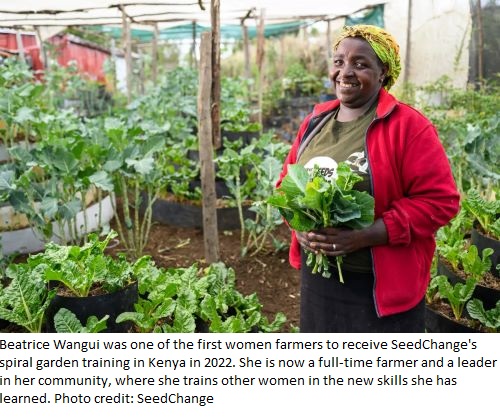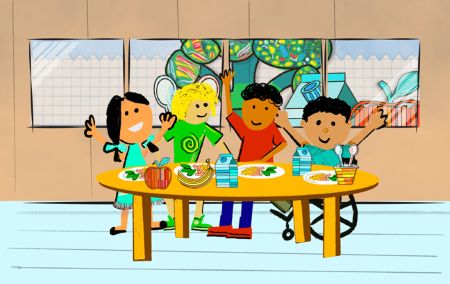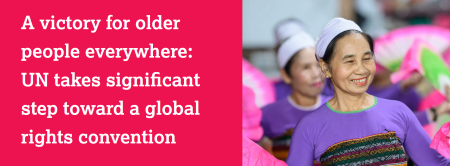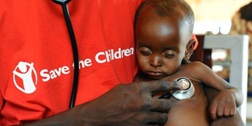
Over the past five months we have been learning, sip by sip, about the complex health, agricultural, environmental, economic, social, political, age, gender, and human rights issues surrounding the Right to Food. We have covered a lot of ground! Today's Small Sip is our final installment before summer.
For this last Sip, we want to celebrate stories of people and organizations who are making a difference by helping to create sustainable food systems and livelihoods. The Dig Deeper section this week is bursting with stories of hope and positive change.
You will find the story of one of The Hunger Project's community "epicentres", a holistic development model created in Africa, by Africans, that currently reaches over 1.5 million people in nine countries across the continent. The Hunger Project's epicentre strategy builds a path to sustainable self-reliance by shifting the power to small-scale producers and promoting community-led development. You will also find a story about eco-entrepreneurship training being offered by the Women's Earth Alliance in partnership with the Uganda Women’s Water Initiative (UWWI), leading to green community-based micro-enterprises that provide sustainable livelihoods for women. You will want to check out the innovative spiral gardens initiative in Kenya, in which SeedChange works with local partner Seed Savers Network Kenya to help deliver agroecology training programs for women farmers with the help of funding from the Canadian government. You can find out about the important work of the Landesa Center for Women's Land Rights, an organization that works side by side with governments and civil society organizations to strengthen land rights to help women thrive equally. And be sure not to miss the video poem that closes this Small Sip for the summer -- a song of strength and determination from the women of Africa.
We hope you feel uplifted as you read about these transformative partnerships and community-based programs. Good work is being done in the world. Let's celebrate it.

Dig Deeper...
- Uganda’s Communal ‘Epicentres’ - At Uganda’s twelve epicentres, which each serve up to 15,000 people, community members are taught how to set up and manage communal farms. They learn regenerative agriculture practices such as composting, intercropping and drip irrigation. These techniques have in turn helped promote biodiversity and improve crop yields and soil fertility. Epicentres take a holistic approach to achieve synergy among programs in health (including HIV/AIDS prevention), education, water and sanitation, adult literacy, nutrition, improved farming and food security, and microfinance.
- Transforming Lives and Livelihoods through Eco-Entrepreneurship -- Read the story of Namuddu Harriet of Uganda and learn how training in climate-adaptation and business management, a seed grant, and two goats helped her establish a liquid manure business that has brought steady income and food security to her family.
- Spiral gardens: food, empowerment, and resilience for women farmers in Kenya -- Spiral gardens are an eco-friendly and climate-resilient way to grow a high density of crops in a small space, with minimal water. SeedChange's spiral gardens training program for women farmers also includes coaching and an honorarium for graduates to train 15 other women so that the benefits "spiral" out into each participant's community.
- Landesa Tanzania Innovating Towards Gender Equality -- The Landesa Center for Women’s Land Rights connects women with the resources they need to secure property rights, works with policymakers to improve laws, and provides education and training tools. Learn what a difference land rights make for women farmers such as Imelda Kalinga in Tanzania.
- "Zum Zum Zum" -- Watch this 3-minute video conveying the strength of African women through the beauty and power of poetry. Zum Zum Zum is a children's song in Tanzania that mimics the sound of bees. It is also a metaphor for the countless hours of work by millions of women -- planting, tilling, and harvesting crops, collecting water, and preparing food that feeds millions. Dr. Monica Mhoja, Landesa Outreach Director for Africa, and Hellen Bulugu, an award-winning poet and activist from Tanzania, give voice to the millions of women who are calling out for the one thing they need most -- a piece of land of their own. (We recommend you click on the cc icon in the bottom right of the view screen to be able to see the English subtitles.)
This is the seventeenth installment in GRAN's Small Sips series on The Right to Food. Small Sips will now pause for the summer months. All previous Small Sips are available on the GRAN website under the Campaigns tab. You can revisit issues that you missed or go back to check out the Dig Deeper resources. We look forward to the return of Small Sips in the fall.



